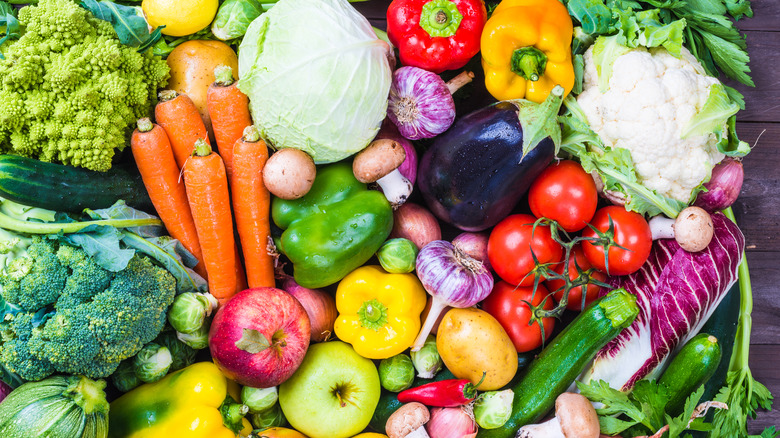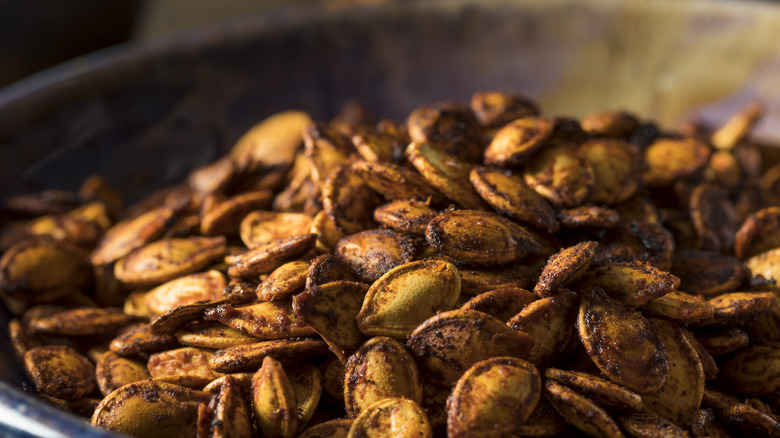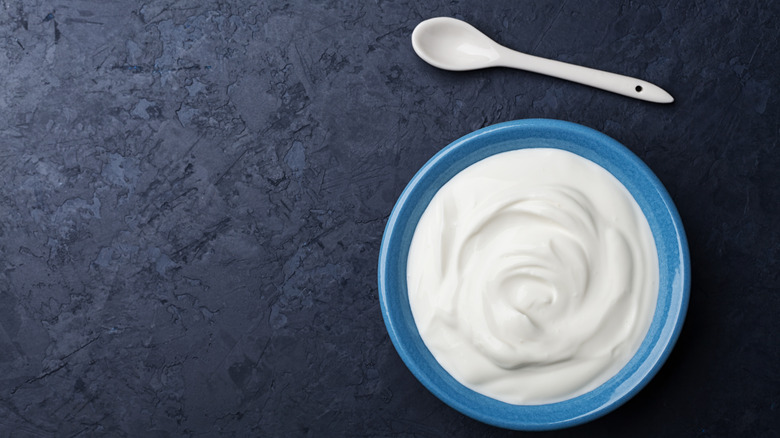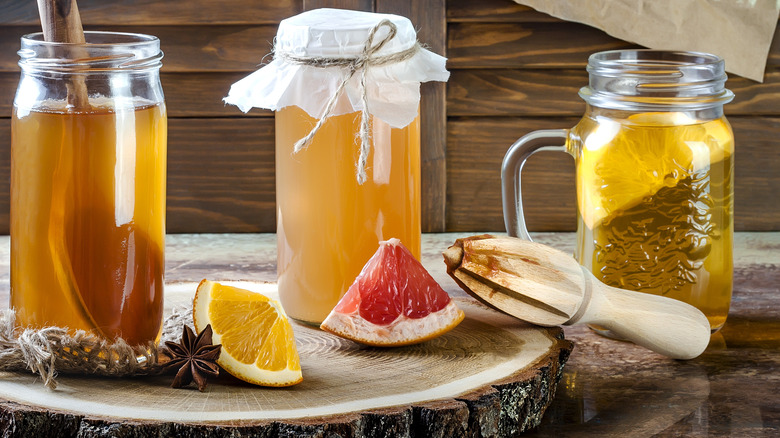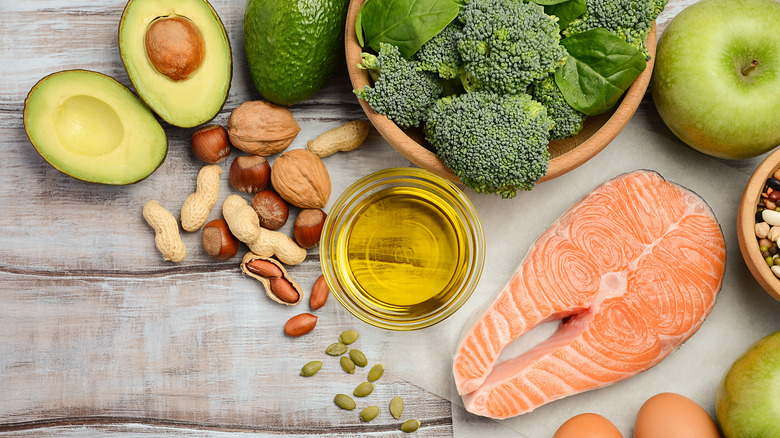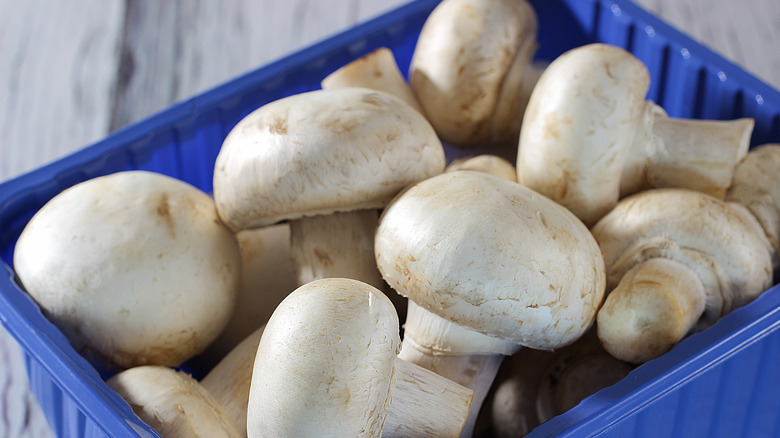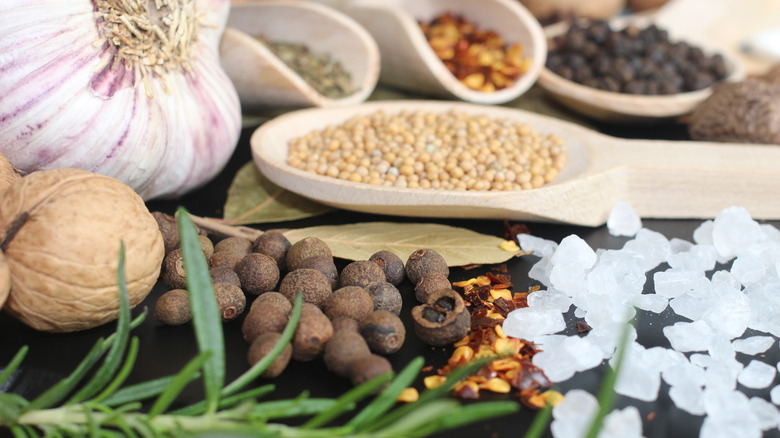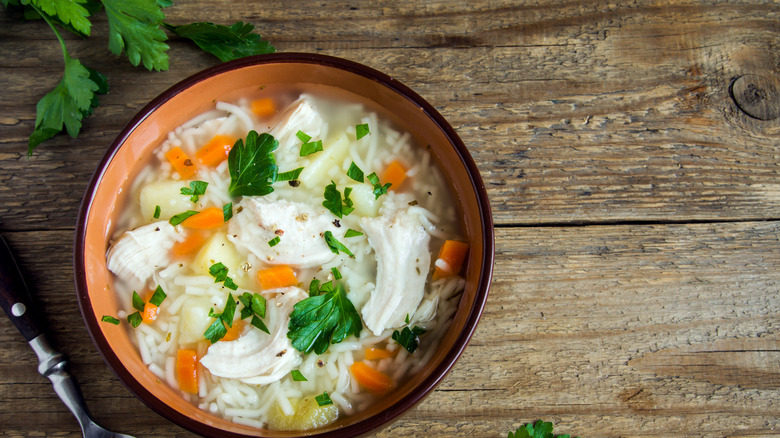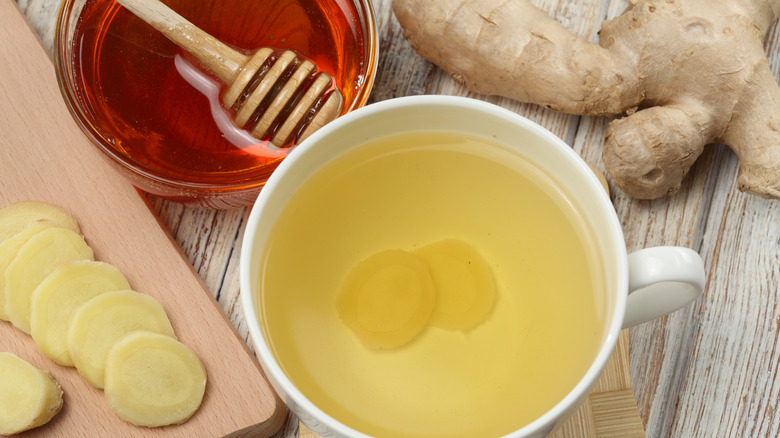Food And Drinks To Help Bolster Your Immune System For Cold And Flu Season
Aaah, fall: the leaves are turning, pumpkin spice everything is here (insert happy dance!), and sweater weather is around the corner. Oh, and everyone has a cold. Talk about a buzzkill. With cold and flu season upon us, most of us could stand to improve our ability to fight off viruses.
As just about anyone who works in healthcare will tell you, the two most important germ-fighting tactics you can deploy are to wash your hands frequently and get a flu shot. Happily, you can also supplement those efforts by consuming foods and drinks that can help bolster your body's ability to fight off any germs you encounter. Here are some of the top choices of dietitians and clinicians alike.
Citrus and other foods rich in vitamin C
In an article written in the Cleveland Clinic Wellness Institute's Health Essentials newsletter, Registered Dietitian and Wellness Manager Kristen Kirkpatrick recommends eating lots of vitamin C-rich foods. Citrus fruits are the first things that come to mind whenever vitamin C is mentioned (well, that and early-aughts pop music), but Kirkpatrick notes that other things like dark leafy greens, red bell peppers, strawberries, papaya, and Brussels sprouts are also excellent sources of vitamin C.
"In fact," she writes, "vitamin C is in so many foods that most people may not need to take supplements unless a doctor advises it." So, feel free to load up on brightly colored fruits and veggies — eating the rainbow will ensure that you get a good dose of this immune-boosting vitamin.
Foods high in zinc
Getting enough zinc is critical to proper immune function. In fact, notes Registered Dietitian Pamela Nisevich Bede in Runner's World, "studies have shown that low zinc levels are associated with a reduced number of T cells, or white blood cells that help your body fight infection."
Impaired immunity isn't fun at any time of year, but it's especially ill-advised during cold and flu season (pun intended — sorry, I couldn't resist!). Nutritionist Cate Ritter also told me that "zinc can help prevent colds and reduce the duration and severity of common cold symptoms," so eating lots of zinc-rich foods can help your body stay healthy in more ways than one.
In order to get your zinc levels into a healthy range, Kirkpatrick recommends chowing down on foods like baked beans (preferably a brand made without added sugar), oysters, crab, poultry, lean meats, yogurt, and chickpeas. Ritter also noted that pumpkin seeds are another excellent source of zinc, which she said are "best enjoyed raw, toasted, roasted, or dehydrated." Ritter recommends adding them to oatmeal, protein shakes, and salads — or grabbing a handful for an on-the-go snack.
Probiotics
Probiotics are getting a lot of attention these days — and rightly so, since they're among nature's powerhouses for fighting off infection. Mucosa-associated lymphoid tissue (MALT), which Registered Dietitian Gabriella Vetere told me "represents almost 70 percent of the entire immune system," is the key piece of this puzzle.
The gut generally, and MALT specifically, is home to what's known as the microbiome — a community of microbes which, according to a study published in the European Review for Medical and Pharmacological Sciences, consists of bacteria that have a mutually-beneficial relationship with the host. The microbiome communicates with the rest of your body, and has "numerous protective, metabolic, and immunological functions" — one of which is to help mobilize the immune system to fight off germs.
Because so much of your immune system is located in your gut, Vetere recommends daily intake of probiotic-rich foods that can help support the immune system. She explained that probiotic-rich foods include yogurt (whether dairy or non-dairy), cultured cottage cheese, kefir, miso soup, and fermented vegetables like kimchi and sauerkraut. These deliver a substantial dose of beneficial bacteria directly into your digestive tract, where they can work with your microbiome to keep your immune system humming along.
Kombucha
Another great source of probiotics is a drink known as kombucha, as Dr. Jacqueline Ivey-Brown, an Illinois-based internal medicine physician, explained to me. Kombucha, which "has been around for more than 2,000 years... has many healthy ingredients and benefits," she told me, and each serving "contains probiotics, B vitamins, enzymes, and organic acids."
Because kombucha is made from black tea mixed with sugar and live bacteria, it's bubbly (pro tip: never shake it before opening the bottle, unless you want to wear it too — I learned this the hard way), and it tastes sweet and tart, with a hint of vinegar.
"Sometimes small bacteria can be found floating around in the drink, but this is not unlike wine sediment and isn't something that should overly concern you," Ivey-Brown told me. So, by all means: drink up!
Fish and other foods rich in omega 3 fatty acids
Integrative medicine specialist Dr. Elizabeth Trattner told me that "the omega 3 fatty acids in flax oil and fatty fish... act as immune boosters by increasing the activity of phagocytes, the white blood cells that eat up bacteria." She explained that they also help keep the body's immune response in check so that it doesn't over-react to an infection.
Great sources of omega 3 fatty acids come from fish like tuna, salmon, sardines, and mackerel, as well as flax seeds and flax oil, and Trattner recommends taking an omega 3 supplement with vitamin E, which she said act together to enhance the immune system.
Mushrooms and other foods rich in vitamin D
We all hear about vitamin D and its benefits for bone health — and it turns out that it's great for the immune system, too. While findings on vitamin D have been mixed in the past, a 2017 meta-analysis of numerous studies published in The BMJ indicated that taking a vitamin D supplement helped protect people from respiratory infections such as the common cold and the flu. According to a TIME magazine article discussing the BMJ analysis, "Those who had low vitamin D levels before they started supplementation got the biggest benefit: For people with the most significant vitamin D deficiencies (blood levels below 10 mg/dl), taking a supplement cut their risk of respiratory infection in half."
You can get vitamin D through both food and supplements since the Cleveland Clinic's Kirkpatrick notes that many people have a hard time absorbing vitamin D from food. In addition to supplements, she recommends fatty fish and fortified foods like milk, orange juice, and cereals.
Melissa Eboli, a certified culinary nutrition expert and wellness counselor, told me that mushrooms are also a great source of vitamin D. She explained that if you leave fresh mushrooms in the sun for an hour or longer, they'll create extra vitamin D from the exposure to sunlight. Adding to the benefits of mushrooms, author and physician Dr. Partha Nandi told me that "shiitake, maitake, and resishi mushrooms increase the productivity of white blood cells" — which, in turn, can help you ward off any germs lurking around inside.
Immune-enhancing herbs and spices
Herb and spice lovers, rejoice! As it turns out, some of the world's best flavor-enhancers can also help enhance your immune system. Dr. Christopher Hollingsworth, a New York-based surgeon, told me that garlic is especially helpful in this regard. "It influences your immune system to fight infection aggressively as well as reducing inflammation," he explained. "Studies have shown that garlic works by fairly advanced mechanisms, influencing the production of immunoglobulins" that can help improve your body's immune response.
Other helpful herbs and spices include ginger, turmeric, and cayenne pepper, as Rebecca Lee, a registered nurse and expert on natural remedies, explained on her blog. Ginger "has antimicrobial, anti-inflammatory, antioxidant, and pain relieving properties," Lee wrote, and is "has the ability to treat respiratory illnesses" like coughs, chest colds, and asthma.
Turmeric, which Lee notes is "treasured for its disease preventing and tumor fighting abilities," can help speed up wound healing, and is often used to treat colds, the flu, headaches, congestion, sore throats, and coughs. Lee also notes that cayenne pepper can "help break through congestion and warm up your body while decreasing inflammation." So, feel free to liberally use the contents of your spice cabinet!
Soup and broth
We all know that chicken soup is the classic get-well-soon meal of choice for many people — but did you know that this is a legit, evidence-backed recommendation and not just an old world remedy?
"Research has shown that [chicken] soup carries immune benefits, thanks to a mild anti-inflammatory effect found in the broth," Bede notes in Runner's World. "The protein in the chicken also helps boost your immune system," and you can add to soup's benefits by adding lots of vegetables like carrots, celery, or spinach.
If chicken soup isn't your thing, Ritter told me that bone broth also confers immune benefits. "Bone broth is the ideal source of gelatin, glycine, proline, glucosamine, glutamine, minerals, and other healing nutrients that work together to benefit overall health," she explained. Luckily, she noted, bone broth is incredibly versatile: you can drink it by the cup, add it to soups, stews, or sauces, or use it to braise vegetables.
Tea with honey
Tea with honey, along with chicken soup, basically forms the Holy Trinity of Cold Care (is that a thing? Let's make it a thing!). Green tea is especially beneficial, as Bede notes in Runner's World, because it leverages the power of EGCG, "a powerful antioxidant abundant in green tea...[that] naturally protects a variety of cells from being weakened and shields them from potential harm" caused by infections or cellular damage.
Adding some honey to your cuppa can both help soothe a scratchy throat and help support your immune system. Miami-based Dietitian Monica Auslander Moreno told me that honey "has immunomodulating properties, lasts indefinitely, tastes incredible....[a]nd it also has some micronutrients." She swears by a teaspoon of Manuka honey, stirred into her daily cup of green tea, to help keep her healthy.
Stay healthy, my friends
While cold and flu season seems like an annual tradition at this point — although far less enjoyable than, say, Thanksgiving, Halloween, or pretty much anything happening around this time of year — the good news is that you can take steps to stay healthy. For the best results, incorporate a variety of these foods and drinks to stay healthy. Now pardon me while I go make a cup of tea with honey and put my mushrooms out in the sun.


